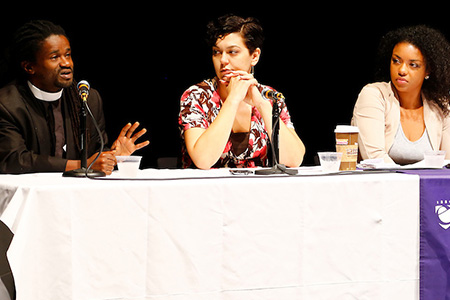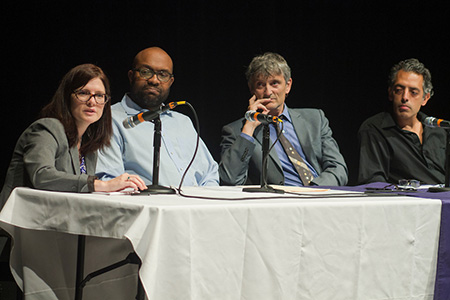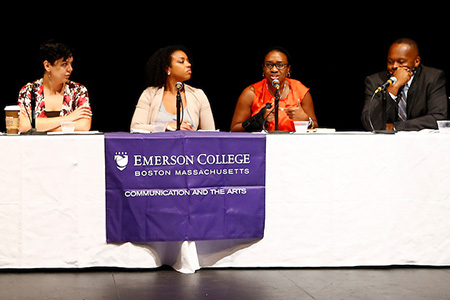Ferguson media impact discussed in forums
An invigorating discussion on September 17 about the racially charged events of Ferguson, Missouri, began with a reminder of America’s legacy of inequality.
“Ferguson is not something that just happened this summer,” said Kelly Bates, executive director of Emerson’s Elma Lewis Center, who began the discussion. “It’s part of a long legacy of the history of this country. It’s something we need to talk about, especially as artists, journalists, communicators, and future leaders.”

Ferguson discussion panelists Rev. Osagyefo Uhuru Sekou and Joanna Marinova of Press Pass TV with the discussion moderator, journalist Danielle DeCourcey ’09, at the Semel Theater on September 17. (Photo by Tyler McAndrew ’16)
Discussion panelist Rev. Osagyefo Uhuru Sekou, of the First Baptist Church of Jamaica Plain, arrived at the Semel Theater just moments after flying back from Ferguson, where he performed activist work. Ferguson has erupted since the fatal police-involved shooting of unarmed black teenager Michael Brown.
“Poor people [are] resisting in a moment in which the American empire, perhaps, may be in its last stage,” Sekou said. “You do not bring tanks out on children when you are winning. People are winning. Perhaps for the first time in the history of our people’s struggle in the United States, poor, black, working-class youth brought America to her knees and demanded that she honor their humanity.”
The panel, to examine the role of traditional and social media coverage on Ferguson, also included Michael Curry, president of the Boston NAACP; Akilah Johnson, reporter for the Boston Globe; and Joanna Marinova, co-director of Press Pass TV.
An earlier panel featuring Emerson faculty members Jabari Asim, Yasser Munif, Nigel Gibson, and Lori Beth Way examined the political and historical dynamics of Ferguson.

Emerson faculty members Lori Beth Way, Jabari Asim, Nigel Gibson, and Yasser Munif, at the Semel Theater on September 17. (Photo by Zachary Mills ’17)
Marinova, whose Press Pass TV works with youth documentary filmmakers, said too often the media are “aftermath specialists.”
“Once it happens, we have all the answers,” Marinova said. “The disparity between the amount of black police officers [and the black population] in Ferguson was existent long before this incident. All of a sudden it reaches a boiling point…What I’d like to see not only from the media, but also from us as human beings, is to stop being aftermath specialists.”
Johnson, who traveled to Ferguson to report for the Globe, said her “pet peeve” was watching other journalists use the story to build up their social media following.
“It’s not about us. It’s not about us. It’s not about us,” she said. “It’s about the people on the ground.”

Ferguson discussion panelists: Joanna Marinova, Danielle DeCourcey ’09, Akilah Johnson, and Michael Curry. (Photo by Tyler McAndrew ’16)
“You have reporters sitting this close to each other, trying to out-snark each other to see who gets the most re-tweets, who gets the most favorites, who can say something that’s going to be the most provocative—not necessarily the most accurate—so…their social influence continues to climb,” Johnson said.
Johnson also said she wishes more reporters would “step out of their comfort zones” and interview people who don’t look, talk, or act like them to get a more complete story.
Sekou made several comments critical of the journalists covering Ferguson, saying many read press releases from the police on-air without fact checking, further demonizing Brown to the American public.
“I’ve said this in the legal community: You have to be perfect to get justice,” said Curry, of the NAACP. “In media and in law enforcement, they look for the imperfection and say, ‘Oh, that’s why you got killed. Of course…you smoked weed.’
“The reality is that you could go to Newton or Wellesley and there are kids selling weed right now, or cocaine and other drugs,” Curry said, “and if [they] were shot today, the community and their parents would be outraged.”
The two-discussion event, titled, “Hands Up: The Police, the Media, and the Shooting of Michael Brown,” was organized by the Elma Lewis Center for Civic Engagement, Learning, and Research; the Office of Multicultural Affairs; the Institute for Liberal Arts and Interdisciplinary Studies; and the Journalism and the Visual and Media Arts programs.
Categories